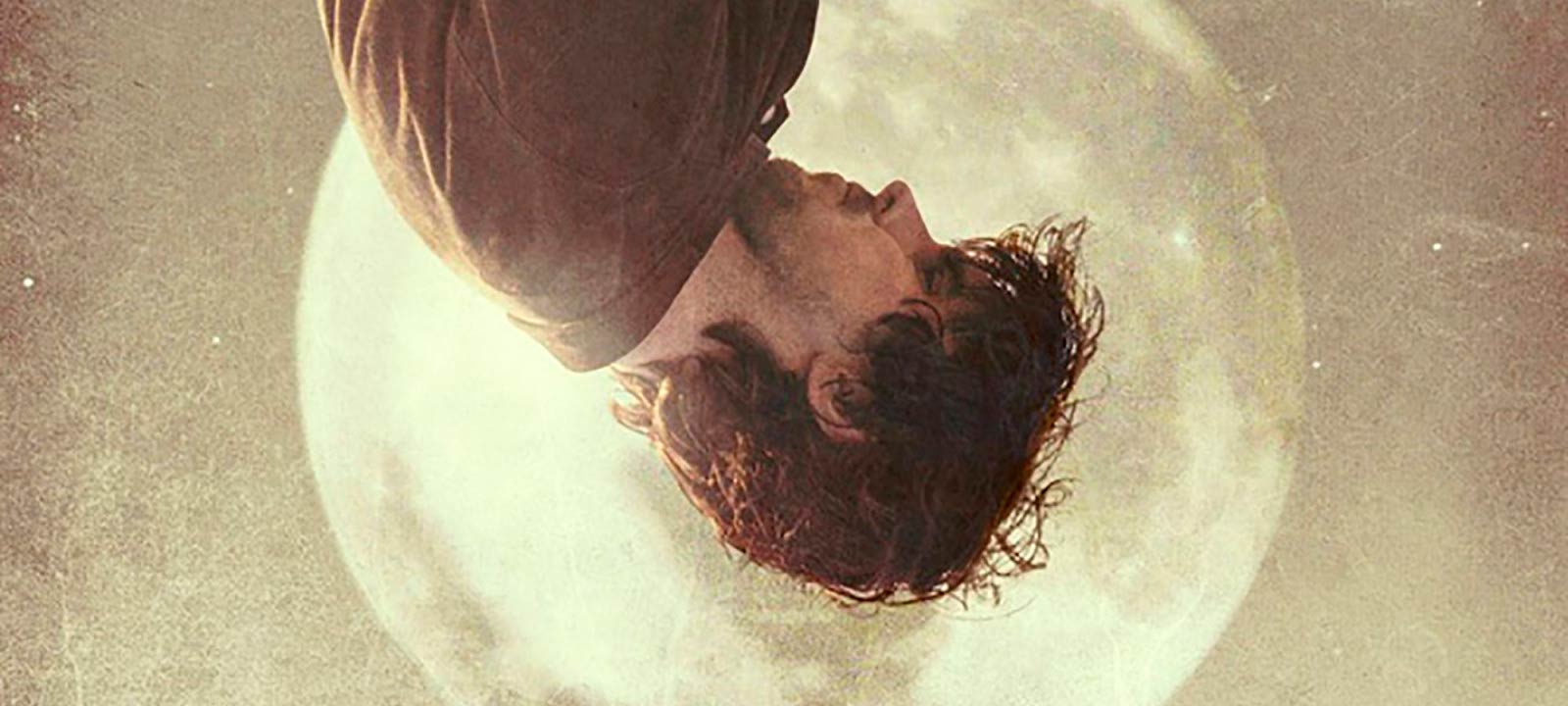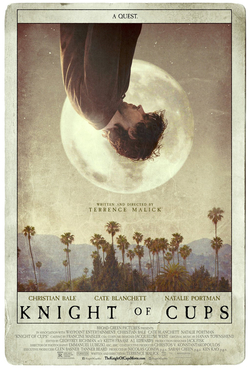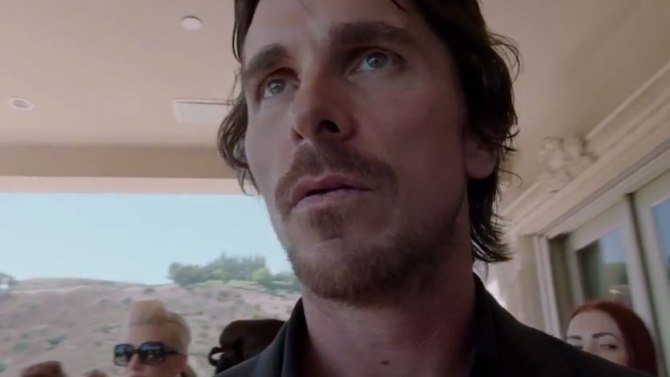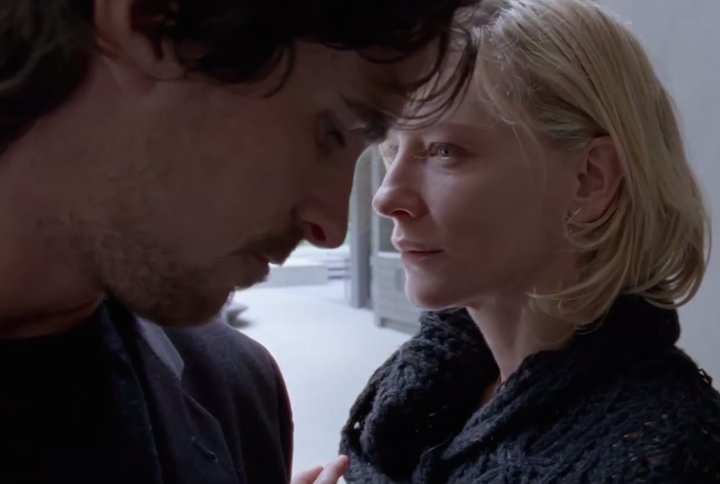Explaining The Knight of Cups Movie as Morality Tale and Parable!! Oh wow. What a truly holy undertaking attempting to sum up this brilliant movie. Looking back on this post I feel almost badly for my past self and his attempt! hahaha. Poor schmuck. Anyway, I have been flipping back through my backlog of movies in order to bring you movies you might not have ever heard of before. And today we are dusting off Malick’s Knight of Cups. If you haven’t seen it before, go find it right here, or here, and watch it, then giggle at my old self as I try to sum this thing up. I know that I am.

Normally when I do a review and a movie explanation I have a formula that works. I talk about what the movie is about. I talk about the surface level details of what exactly happened. Maybe I will outline that actual events and then I will talk through why things happened and the director’s goals and objectives. And then I will lean out into the land of conjecture, and start creating theories and ideas that tie the whole thing in a nice little package. It’s a formula that has bought me a PILE of traffic. You guys totally dig that formula, mainly because once you read it you then can select the theory you like best and then you can comment about how or why you think that’s the one. Or, better yet, you can give your own theory that is a permutation of one of the theories I put forward.
It’s a winning formula.
But there is no way, in God’s gloriously green and beautiful world that that formula will work for Malick’s movie The Knight of Cups. None. Malick is a movie producer and creator that is unlike any other movie creator in all of Hollywood. (Which I say loosely even… is he even “in” Hollywood? No. I would argue he isn’t. But I’ll get to that later.) Here… let’s put it this way. After watching The Knight of Cups a month ago, I haven’t gone anywhere near writing about it. I was too smashed by the movie to even start putting words together about it. The night after I watched the movie I dreamt all night long about chasing Malick down for, not an interview, but for a mentorship? Is that the right word? I wanted to deeply and realistically connect with him. I wanted to talk with him about the meaning of life. I wanted to sit and listen to him pontificate. I wanted him to just bloviate and I just wanted to listen. and listen. and listen.
But I couldn’t find him. I couldn’t get to him. I had no idea how to make this happen, but there was something gnawing at my soul that if I didn’t find him I would be worse off for it. I would fail, not for a blog posting, or for some review. But I would have missed out on something large. I would have been incomplete somehow as a result.
This is the kind of a movie we are talking about here today. Malick’s The Knight of Cups is not your average mind-job movie. The Knight of Cups is about longing. Loss. Desire. Failing. The Knight of Cups is about yearning for something so much bigger. Which rang something so deep inside my own soul that it awoke in me my own Balrog, that was intent on casting me down into the depths below the Bridge of Khazad-dûm. Sure, it sounds like hyperbole, but it isn’t. I identified with this movie way way more than I would like to admit. But I get ahead of myself.
The Knight of Cups Overview
Malick has done a couple movies like this at this point, highly abstract ramblings that drive more to the emotion of a thing, than to the actual topic at hand. Movies like To the Wonder, Tree of Life, Voyage of Time, etc., all have a singular production quality and singular vision of the world. I’d be shocked if we don’t later find out that all of these movies by Mallick aren’t part of a much larger and grander vision.
At a high level, The Knight of Cups plot is simple enough. A screenwriter living in Los Angeles tries to make sense of the strange events occurring around him. While he’s successful in his career, his life feels empty. Haunted by the death of one brother and the dire circumstances of the other, he finds temporary solace in the Hollywood excess that defines his existence. Women provide a distraction to the daily pain he must endure. And every encounter that comes his way brings him closer to finding his place in the world.
But really? This is like saying The Hobbit is about a little person that gets pulled in on a hunt for gold. Well, sure, I guess? But not really. The hobbit learns and grows. The hobbit realizes that his safe cozy home is not really where he’s meant to be or needed. Etc. Similarly to this, Knight of Cups’ overview will never adequately capture it. Ok, it’s about a Hollywood producer. Great. But it’s also a story that very closely mirror’s Mallick’s own. Mallick is a movie producer. He also has one living brother and one that died young in life. And so we wonder, is this larger vision really just Mallick’s life passing before our eyes on the technicolor screen? And to support this perspective, that what we are seeing really is just Mallick’s own life, here is a better, long form synopsis of the film and what it’s goals and agenda is…
Rick is a slave to the Hollywood system. He is addicted to success but simultaneously despairs at the emptiness of his life. He is at home in a world of illusions but seeks real life. Like the tarot card of the title, Rick is easily bored and needs outside stimulation. But the Knight of Cups is also an artist, a romantic and an adventurer.
In Terrence Malick’s seventh film a gliding camera once again accompanies a tormented hero on his search for meaning. Once again a voiceover is laid over images which also seek their own authenticity. And once again Malick seems to put the world out of joint. His symphonic flow of images contrasts cold, functional architecture with the ageless beauty of nature. Rick’s internal monologue coalesces with the voices of the women who cross his path, women who represent different principles in life: while one lives in the real world, the other embodies beauty and sensuality. Which path will Rick choose? In the city of angels and the desert that surrounds it, will he find his own way?
And just so you have a little bit of the actual visual punch that Mallick brings to the movie we have the trailer for Knight of Cups as well…
We are also treated to emotions, large swathes of emotions, so much so, it’s as if our own soul has been plugged into a light socket and lit non-stop for 2 hours straight. Visually it’s a sumptuous feast. Aurally, a sumptuous feast. The only thing missing is some sort of haptic tactile feedback function – which Mallick would have added in a heartbeat if only to round out our sensory experience. Antonio Banderas talked a little bit about how Mallick shoots, and how he works, and what he does to pull these stream of consciousness movies together:
“I arrived to the set and basically what [Malick] said to me, ‘Antonio, we didn’t send you a script because we don’t have a script and so this monologue that I gave you,’ which literally didn’t make sense whatsoever, ‘I’m gonna shoot it in nine different locations and I’m gonna just improvise with you, and I’m gonna send you something that I call torpedoes.’ And these torpedoes, they were people that came in the middle of the monologue and started improvising with me. He sent me a beautiful woman, he sent me an old lady, he sent me a bunch of three guys that are rappers. I ended up in a pool with three ladies.”
But it’s a man, that is lost. He is so so lost… and in desperate need of someone to save him. This is my story. This is your story. We are Rick. And Rick is us. No, we aren’t movie directors. No, we aren’t Mallick. But we can relate to Mallick and the universality of his plight.
Knight of Cups as Morality Play
This movie is not a religious movie. And yet it is deeply grounded in spirituality and the universality of this idea of spiritual wandering. I wouldn’t recommend this to my Christian friends. And yet, I would recommend this to my Christian friends. Because this really is a movie grounded in the ideals and ideas of Parables and morality plays. I would go so far as to say that the Knight of Cups is nothing more than a modern retelling of the Jesus’ parable of the prodigal son. And I would even go so far as to say that this isn’t an accident. This is Mallick’s specific intent. He actively decided he was going to make a big budget movie with enormous A-stars in it (Christian Bale, Cate Blanchett, Natalie Portman, Antonio Banderas, Brian Dennehy, so many A-listed stars that you wonder if Mallick just got permission to film a Hollywood party in the round…) that really was just a cover for Biblical story about a son that has rebelled against his father, and run off to the big city to make a name for himself.
Don’t believe me? The film opens with an audio excerpt from “The Pilgrim’s Progress” (which I believe was recited by John Gielgud). Not a derivation, not an homage… a literal cut from Pilgrim’s Progress audio track. But what is “The Pilgrim’s Progress” even about? Well, in short, it is the story of Christian, and his realization of his lostness. And as a result, it is the story of his travels from his hometown entitled “City of Destruction” on to the “Celestial City” or heaven. But Christian is very weighed down by the knowledge of his enormous sin, which he came to realize from his reading of the book in his hand (the Bible.) And it is this gigantic burden that would cause him to sink into hell… and therefore he decided he must seek out deliverance.
Is this a coincidence? Hahaha.
Soon after the movie launches we are given a narration (by Brian Dennehy) about the ancient tale of a knight from the East who was sent out by his father in search for a marvelous pearl, but, ended up drinking from a cup that caused him to drop into a deep slumber. And it is with this narration that I would submit to you we are getting slices and dices of many different parables Jesus told. The first and most obvious would be the parable of the pearl of great price. If you are unfamiliar, it’s a simple enough story, just two verses in fact. Heck, let’s just quote it here – “Again, the kingdom of heaven is like a merchant looking for fine pearls. When he found one of great value, he went away and sold everything he had and bought it.” The king sends his son off to find the meaning of life, to conquer this philosophical meaning, to bring back this elusive truth, and he basically is drugged into a stupor by life. He forgets he’s even on a search for the pearl. He loses track of his purpose or even what it was he was supposed to be searching for. Another parable that rings true here would be the parable of the Wicked Tenants.
But the Biblical story that trumps all stories that Malick is obviously referring to here is the story of the Prodigal Son. Do you know this story? I’m sure you have a simple idea about the story if not an in depth idea. But in short, the story is all about a son who decides, you know what?!? I want my inheritance now so that I can live today. I don’t want to wait until my father passes away. And so the father gives him what will be due him later. He hands him the money. And off he goes – merrily trucking his way to frickin Las Vegas, hell-bent on playing his numbers until he hits it big – seven come eleven baby. Right?
What you don’t know about that story is that by doing this to his father, by taking his inheritance, the son just wished his father dead. To that culture, in that day… the son just flipped his father the bird, mooned him, and then pissed on his shoes in one fell swoop. In that day, everyone lived in houses that leaned on one another. They were built off one another. Their towns were close mind you. So when this pissant of a son pulls off this full gainer off the high dive, EVERYONE KNOWS ABOUT IT. And ultimately, as you know, the son ends up mucking pig stalls to make a buck because, damn it if all his money isn’t gone before he realizes. And then he gets the truly ballsy idea, man father’s servants live better than this. I’m going to go home and become a servant for my dad! Hahahaha. What a HORRIBLE idea. If I were this kid’s dad? I’d keep a sniper rifle at my side at all times, so that when he heads back to town I could knock him dead at 3 clicks.
But no! The father sees him coming from a long long way off (literally says that in the parable, well, minus the repetition) and goes hauling ass down the road to welcome him home.
Can you believe that? Can you imagine it?
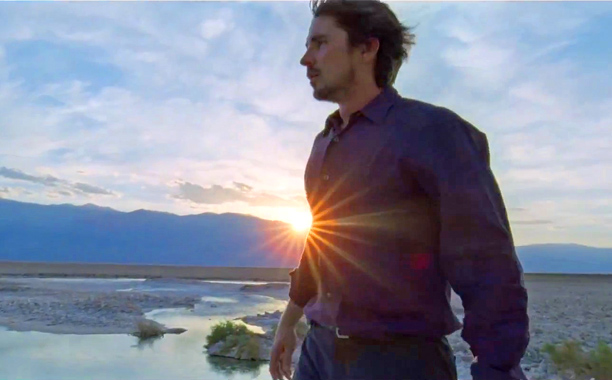
And so Rick is lost. He’s lost a since of what he’s lost even. He is living the high life in Hollywood. He’s surrounded by the world’s “most important people”. And yet, he has no meaning. No purpose. So he takes to womanizing. Drink. Cavorting. When Christian Bale’s gruff voice drops in us in voiceover to announce that he is: “Fragments of a man”, whispers Bale, gruffly. “Where did I go wrong?” How could the prince possibly have wandered off the track in his search for the pearl? Six different women dance across the screen as eye-candy entanglements for Rick, sirens that pull him deeper and deeper under the water of the ocean, with less and less hope of being restored. Even Only Cate Blanchett’s character has any depth to her at all. And she is shattered by her husband Rick. A depressed character who will not stand her husband’s affairs and distracted wanderings any more.
There is a side thread (though it should have been decidedly more central) between his father Joseph (Dennehy) and brother Barry (Wes Bentley) who are obviously still mourning the lose of the third brother. Like constellations of planets circling one another we sense their grief and we see their passion for their lost loved one, but a lot of the gravity is lost in the wistfulness of this particular production. But it does continue to ground us and show us what is really important here… that the grim reaper is standing outside of frame, awaiting for the conclusion of the play, and the struggle, the assertions of meaning. He is standing there and awaiting for our time to be called. And it is that idea, the larger, bigger picture, that really gives this movie poignance. We know that we are winding down. We know that the things we used to play at are insignificant. We know that the meaning of life has somehow alluded us. That we have drifted to sleep because of the strong cup of whatever that was that that mermaidy woman gave us… and what was that that you were saying? Because somehow, I’ve just lost 40 years of my life and now I’m wondering how I got here. “All those years, living the life of someone I didn’t know,” murmurs Rick again from another foreboding voiceover.
I personally loved this movie. But 70% of you will not. Well, no, 40% of you will not. 70% of the average viewing public will not. Yes? More clear? The movie made me want to snap open my ribcage and let loose the dreams of my soul. I literally envisioned myself doing that as the movie rolled on in front of my cortexes. The sound design, the cinematography, the spastic storytelling, the God-like voice overs… all accumulated into a story that made me really wonder at my own accomplishments. Made me wonder at whether I’d done enough. It made me wonder if I’d done enough really important things. And while I was thinking, what, really, is an important thing? You know? Not, “Man, I needed to get more job promotions.” But rather, “Man, I need to help more homeless people.” “Man, what am I doing for the widow? The orphan? What have I done that will really leave a legacy?” And that, in my opinion, is the definition of a movie that is good. Not a good movie. But a movie that is good… if you understand my meaning there…
So, I don’t know if my explaining the Knight of Cups Movie as morality tale and parable worked for you, but from a counseling standpoint in my own life? It was worth it’s weight in gold.

